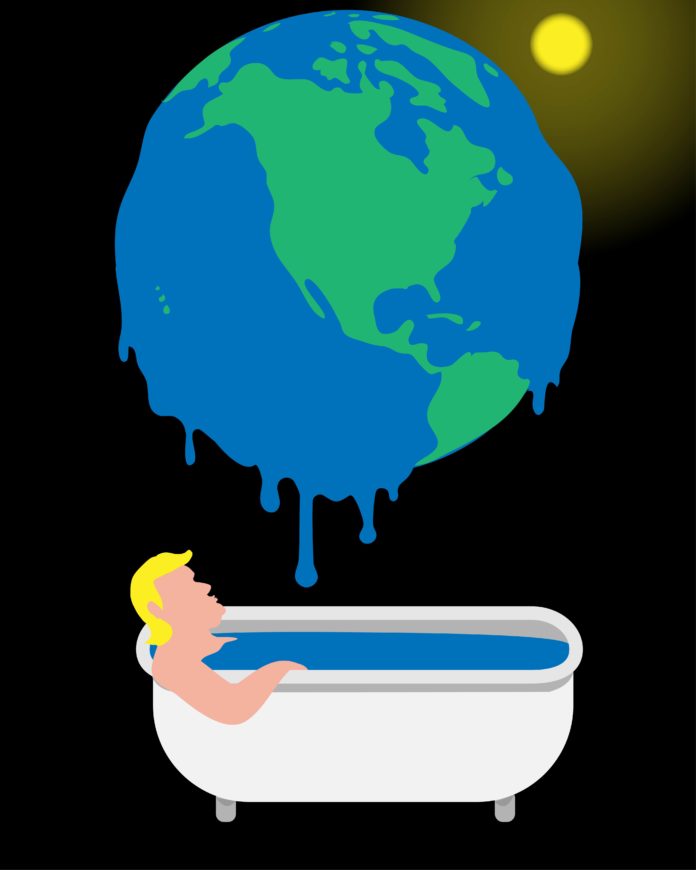The world is getting warmer, and the Trump administration continues to grow colder toward the situation.
Thirteen federal agencies released a report on current and predicted effects of global warming on American public health, ecosystems, agriculture, infrastructure and economy on Nov. 23, to which President Donald Trump responded, “I don’t believe it.”
The report said “future risks from climate change depend primarily on decisions made today.” Waiting for future generations to find solutions is not an option; our current actions matter. Ignoring these issues until they affect us is not an option — we are facing the consequences now.
According to the report, among the sectors negatively impacted by rising temperatures are reduced efficiency of power generation, increased exposure to water and food borne diseases as well as allergic illnesses, increased vulnerability to agriculture and fisheries. Subsequent rising ocean levels endanger coastal communities and infrastructure.
For each of the endangered fields, the report provides policy recommendations to alleviate and even prevent the negative effects of climate change. The only mentioned field in which effects are “already locked in” is for rising sea levels for coastal communities and infrastructure. Yet, the report estimated that “well-timed adaptation measures” could prevent over half of the damages to coastal property, nullifying the argument that the situation can not be helped at this point.
There is not a lack of ideas for solutions; there is a lack of urgency and motivation.
Trump responded to the report saying, “But if we’re clean, but every other place on Earth is dirty, that’s not so good.”
While the report indicates a need for global changes, the United States can not excuse itself from responsibility altogether. There is a need for international reform, but just because our country can not regulate every other nation does not mean it should neglect its responsibility to govern itself.
The Environmental Protection Agency found the United States accountable for 15 percent of all carbon dioxide emissions but only 5 percent of the population in 2014. The only country producing more CO2 was China, comprising 30 percent of the world’s total.
The mindset of excusing your own actions because others are doing the same is faulty. It leads to normalization and acceptance of bad behavior.
The United States should take the initiative to rise above norm and excel, setting a standard and precedent for eco-friendly legislation.
So far, the Trump administration has not made legislation supporting environmental stewardship. The League of Conservation Voters, a non-profit that has evaluated every Congress since 1970, gave Trump a failing grade and GOP Senators a 1 percent average score in 2017, the lowest scores in the organization’s history.
Bloomberg listed environmental legislation either revoked or being replaced by more lenient policy. Among the rules the Trump administration has overturned is: required reporting of methane leaks in oil and gas companies, limits on industrial toxic emissions and protections for groundwater in certain uranium mines.
There is a clear pattern of prioritizing economic progress seen in the favor of increasing factory productivity over slowing down to consider environmental dangers. While it seems Trump is successfully championing the economic and business tact that he promised during his presidential campaign, the long-term effects of this type of legislation will end up being detrimental to the economy as well.
It is not a decision between economic progress and environmental care. The latter must be preserved for the former to exist.
The report estimated continued growth in emissions will cause hundreds of billions of dollars in annual losses by the end of the century, which is “more than the current gross domestic product (GDP) of many U.S. states.”
There is a direct correlation between the environment and economy. For example, agriculture and its related industries are dependent on the state of the environment and are thus at high risk in the projected escalation of climate change. The United States Department of Agriculture reported the agriculture industry as 5.5 percent of the U.S. gross domestic product.
The Trump administration has brought economic growth. Forbes recorded successes such as lowered unemployment rates, continued job growth and increased hourly wages under the Trump administration. However, this success will not last long-term if it does not acknowledge its responsibility to restrict greenhouse gases.






